
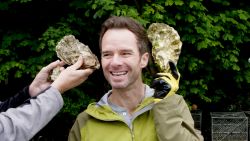
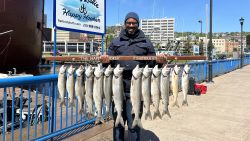
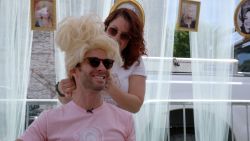
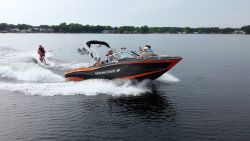
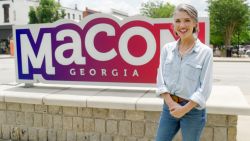



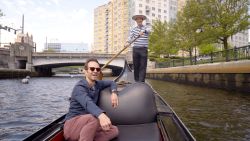

Thirty-five miles south of Seattle, Tacoma resembles its better-known neighbor in many quintessential Pacific Northwest ways. Simply turn toward the thriving coffee and brewery scenes, or soak in the artsy, hipster vibes spread across distinctive neighborhoods that offer a bit of grit and plenty of personality.
Yet this old railroad town, where the “rails met the sails” as the western terminus of the Northern Pacific Railway, today draws its own fan base thanks to its smaller size (population: around 223,000), slower pace and more chilled-out charm than its northern counterpart.
Sitting at a patio table with water and mountain views on a bluebird-sky Northwest day will easily convince you that few better corners of our world exist. As seagulls dip in and out of the picture and the occasional eagle soars overhead, it’s easy to see how Tacoma’s scenic location along the Salish Sea (of which Puget Sound is part) offers access to an abundance of surrounding splendor.
Situated about 60 miles (almost 100 kilometers) northwest of Mount Rainier National Park and 80 miles east of Olympic National Park, Tacoma dazzles outdoor adventurers within city limits, too.
Natural assets and urban transformation
more america's best TOWNS to visit 2024
Tacoma’s 760-acre Point Defiance Park serves as a tranquil refuge with botanical gardens, old-growth forest, hiking trails and shoreline beach. A recent $7 million overhaul of the tropical reef aquarium at the in-park Point Defiance Zoo & Aquarium was unveiled June 14.
And fans of “Dune” appreciate learning that the park’s Dune Peninsula is named after author Frank Herbert, a Tacoma native. It’s said that, back when the peninsula was a slag heap for the Asarco copper smelter, it helped inspire the writer’s eco-thriller set in a blasted land. The peninsula is now one of the most scenic areas of the city, with the Frank Herbert Trail skirting the perimeter.
“The city itself has undergone a remarkable transformation, with a revitalized downtown filled with excellent restaurants, art galleries, museums and parks, along with great entertainment and accommodations at the Emerald Queen Casino,” says David Gudgel, CEO of seaplane outfit Kenmore Air. “The Chihuly Bridge of Glass is a must-see art installation, and the Museum of Glass with its iconic cone architecture is one of the most unique museums in the world.”
While this destination hasn’t escaped typical challenges faced by most West Coast cities, in terms of homelessness and social issues, Tacoma’s rollercoaster story arc has brought it a long way in the past few decades.
A few 1970s-to-’90s woes have largely abated – from gang and safety concerns to the notorious “Aroma of Tacoma,” a wafting odor caused by some 100 years of nearby industrial development.
Both literally and figuratively, the city has cleaned up without sacrificing the edge that inspired its locally embraced nickname of “Grit City.”
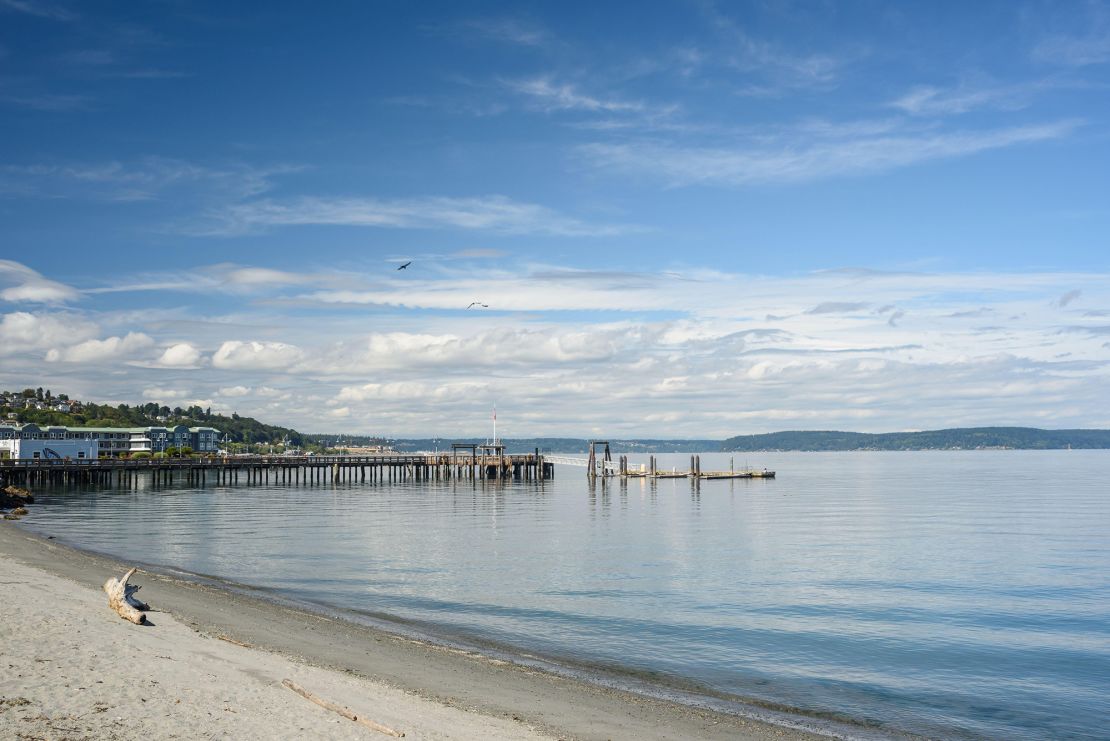
Soaking up regional beauty on trails and waterways
Tacoma has a small-town feel with big-time access, says Kathy Conn, an East Coast transplant who has called Tacoma home since 2018 (having lived in Seattle for six years before that).
“Tacoma has a wonderfully local and real vibe versus some anonymity that can occur in bigger cities,” she says.
Conn takes full advantage of outdoor adventure options, partaking in hiking, camping and backpacking, paddle boarding and sea kayaking. In colder months, it’s snowboarding and snowshoeing.
“Tacoma has easy access to Mount Rainier and the Olympic Peninsula,” she says, “and lots of water put-ins to Puget Sound and island ferries. There aren’t too many places where you can see a national park volcanic mountain (Rainier) while dipping toes in saltwater, like we can from the waterfront along Ruston (Way) and Point Defiance Park.”

Discovering a vibrant hub for glass art
As the hometown of famed artist Dale Chihuly, one of the first Studio Glass artists to import techniques from Venetian glass factories he visited in Murano, Italy, Tacoma generates buzz as a true glass art city.
Benjamin Cobb, the hot shop director and lead gaffer at the Museum of Glass, says glass is woven into the very fabric of Tacoma, and Chihuly is the impetus for this connection.
“I’ve seen his artwork in elementary school classrooms!” he says. “Dale put glass on the map back in the ’70s and ’80s, and as he became more of a household name, it brought more attention to the material of glass as an art medium.”
Since opening doors to the public in July 2002, the Museum of Glass has strived to give audiences a glimpse into the working artist studio.
“They can visit our dynamic gallery exhibitions and then take a seat in the hot shop to watch the creative process unfold,” says Cobb. Another highlight, the 500-foot (152-meter) Bridge of Glass, is a pedestrian overpass that holds three Chihuly installations and links the museum to downtown Tacoma.
Cobb shares that Tacoma is also home to the Hilltop Artists program, established in the 1990s to help schoolchildren with diverse backgrounds stay on track. Today the organization serves underprivileged students, offering free glass instruction and mentorship and puts on events showcasing their work.
“Glassmaking is a team-oriented process,” he explains, “and showing this approach helped kids learn to work with each other and move past any differences they might be going through.”
Residents and visitors alike enjoy trying their hand at private hot shops around town, such as Area 253 and Tacoma Glassblowing Studio.
Soaring high above it all
Seeing Tacoma from the air offers an even loftier perspective.
In partnership with the Puyallup Tribe, Kenmore Air is in its second year of scenic South Sound seaplane tours out of Tacoma, and in its first season of scheduled flight service to San Juan Island.
“We’ve had a front row seat to the area’s incredible diversity over the last few years,” says Kenmore’s Gudgel.
He expands on the significance of the seaplane partnership.
Tacoma, WA: No. 3 on America's Best Towns to Visit list
“The scenic flight tours over the lands of the Puyallup Tribe of Indians provide a powerful perspective on their deep ties to this region that span thousands of years,” he says. “From the air, passengers can truly appreciate the stunning natural beauty of the tribe’s ancestral lands stretching from the waters of Puget Sound to the towering Cascade mountains.
“For the Puyallup people, this land is deeply sacred, and their identity is inseparable from the rivers, forests, prairies and coastline that have sustained their way of life,” Gudgel says.
The narrated flightseeing tours point out places of immense cultural significance and explain the meaning of traditional place names originating from Lushootseed, the language of the Puyallup people that’s deeply intertwined with the landscape.
Gudgel suggests that this aerial perspective helps reconnect passengers to the Puyallup Tribe’s enduring legacy as the original stewards of this land.
While soaring over these people’s ancestral territory, he says, one can’t help but feel deeply appreciative of how they cultivated such a rich culture closely linked to the natural world in their midst.
Checking in with local business owners
Chris Staudinger co-owns Pretty Gritty Tours, a Tacoma-based walking tour company that works hard to bolster the reputation of the Pacific Northwest.
ESSENTIAL TACOMA
- EAT: A “lobster bomb” at Tibbitts @ FernHill and grilled pork belly at James Beard Award semifinalist The Table
- DRINK: A Margarita Speziata at en Rama or a tasty tiki creation at Devil’s Reef
- STAY: At Silver Cloud Hotel Tacoma at Point Ruston Waterfront or glass art-themed Hotel Murano
- PLAY: Go to McMenamins Elks Temple for music, drinks and more
“Tacoma is in a moment of expansion with tons of bright entrepreneurs coming to start businesses, and they are all so Tacoma positive,” he says.
Pretty Gritty’s tour itineraries range from kayaking excursions and downtown ghost walks to explorations of Stadium High School, commonly referred to as the Brown Castle of “10 Things I Hate About You” big-screen fame.
Their beer-centric tours feature spots from Odd Otter Brewing Company to 7 Seas Brewing, a friendly hangout described by some as Tacoma’s living room.
Inspiring chefs on the rise also exhibit fierce regional pride as they make the most of fresh-from-the-sound seafood and other seasonal goods.
Chef Shawn Tibbitts, owner-operator of brunch hot spot Tibbitts @ Fern Hill, feels excited about this “passionate foodie city’s” diversity of food culture. “We have a lot of small businesses growing and a lot of the locals are supporting them, which makes me proud to see folks who inspire someone’s dreams!” he says. “Food is our soul’s energy.”
Tibbitts, who’s leaning into his Alaskan Native heritage, bases his breakfast-only menu off creativity and a desire to stray from what everyone else is doing.
Visitors also find plenty of personality along 6th Ave, deemed “young, eclectic, creative and caffeinated” by one local. Vinyl and vintage shops rub up against a gourmet hot dog eatery (The Red Hot) and unassuming MSM (Magical Sandwich Makers) Deli, where queues regularly form out the door.
Enjoying the best of the best
Gudgel suggests that no Tacoma visit is complete without strolling along the scenic, two-mile Ruston Way waterfront that “hugs the shoreline of Commencement Bay, providing magnificent views of the Puget Sound and nearby islands.”
Along the route, visitors find the best of what defines this place — parks, restaurants with outdoor patios and public art installations.
“It’s the perfect place to take in a stunning scenic flight with us to explore the area from above,” he says, “or to enjoy a classic Pacific Northwest sunset over the water.”
No matter where you watch the sun slink behind the horizon and captivating peaks, you’ll no doubt feel the immensity of Mother Nature, whose starring role in this city’s story is always top of mind.
Next town: Portland, Maine is No. 4
Dig into this culinary hot spot with a “big-city feel in a small-city package.”
East Coast native Corinne Whiting has a deep love for the Pacific Northwest, and most appreciates freelancing assignments that expose her to the passionate people who give a place heart.








